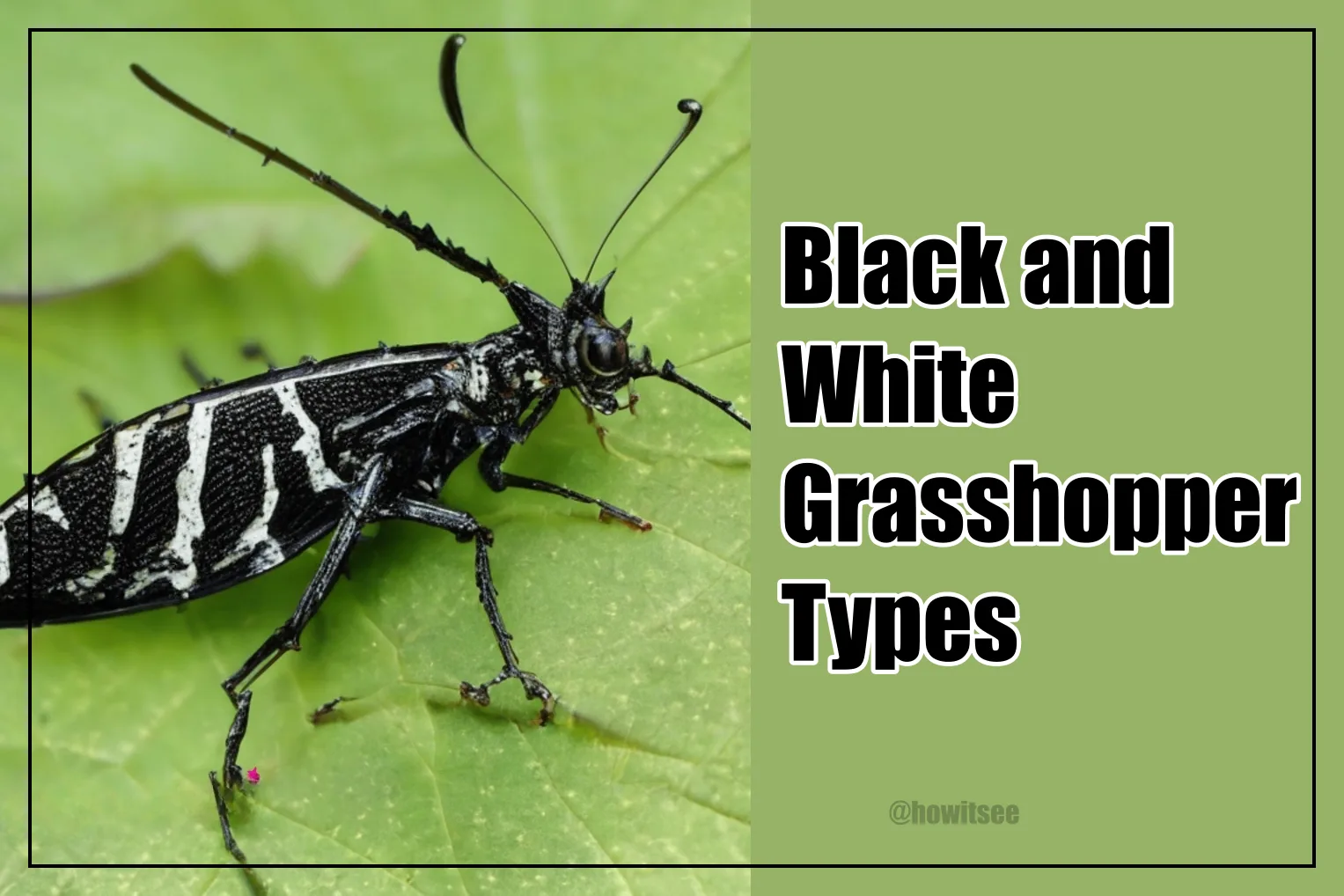Grasshoppers are the most common type of insect, and you can even find them in your backyard. They are found in different colors in nature, like green, brown, etc. Have you heard about black and white grasshoppers? Sounds fascinating, right?
In this article, you can learn about these fascinating creatures. So here is the information about 14 black and white grasshoppers that are found in nature.
14 Black and White Grasshopper Types
1. Eastern Lubber Grasshopper
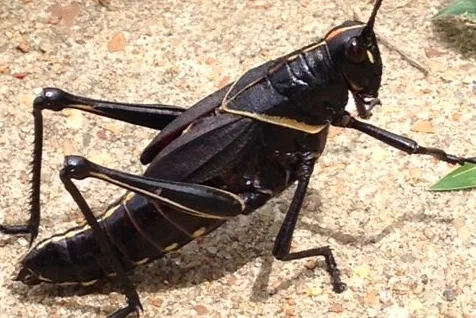
|
Scientific name |
Romalea microptera |
|
Size |
64-76 mm |
|
Location |
South eastern US |
|
Identification |
Black body with white markings |
This genus of grasshopper is native to South eastern US and they are known for their unique color and size. They are one of the Giant black and white colored grasshoppers.
They are characterized by black spots and markings. In the adult stage, either they are entirely black or have yellow or white markings on them.
The black morph adult stage of this grasshopper is also known as black diablo. This species of grasshopper, R. microptera, also follow several defense strategies.
They are brightly colored by which they warn the predators that they are not worth eating. This phenomenon is known as Aposematism.
2. Green Legged Grasshopper
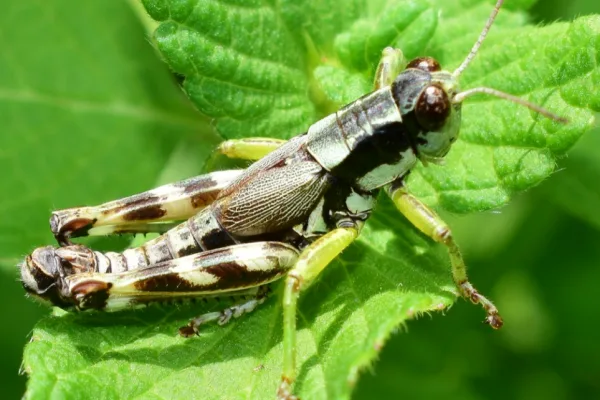
|
Scientific name |
Melanoplus viridipes |
|
Size |
17-25 mm |
|
Location |
Livingston, Oakland, Washtenaw |
|
Identification |
Characteristic green legs |
This herbivore species of grasshopper is found on the ground, in low vegetation or in open woods. They are characterized by their green legs.
Females are comparatively larger than males. The size of males ranges from 17.5 to 18.5 mm, and females body sizes range from 21.5 to 25.5 mm.
The lower half of the pronotum is white, and the top of it is either black or black with white patches. Their wings are short and cover only half of the abdomen.
3. Red Legged Grasshopper Nymphs
|
Scientific name |
Melanoplus femurrubrum |
|
Size |
1.5 inches |
|
Location |
North America |
|
Identification |
Black body with red legs |
The red-legged grasshoppers are used as a model organism because they are widely distributed in all parts of North America and because of their responsiveness to climate change.
The nymphs are difficult to identify with this species. The nymphs of this species vary in coloration, like green, yellow, orange, or brown and have black or grayish markings on them.
Females of this species are also larger than males. The body sizes of males range from 1.7cm to 2.4 cm, and females body sizes range from 1.8 cm to 3.0 cm.
This North American native species is univoltine, and they prefer areas of thick vegetation and grasslands.
4. White Whiskered Grasshopper
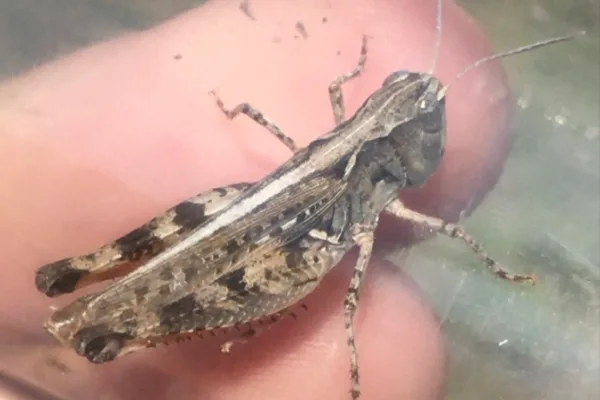
|
Scientific name |
Ageneotettix deorum |
|
Size |
0.75 inches |
|
Location |
North America |
|
Identification |
Thread like white antennae |
Ageneotettix deorum, also known as the white whisker grasshopper, belongs to the diverse group of slant-faced grasshoppers.
They are widely distributed in the grasslands of North America
They are characterized by their long, thread-like white antennae, which resemble the old man’s whiskers.
The junction of the femur and tibia is black in color, and white strips run along the entire length of the body.
5. Two Striped Grasshopper
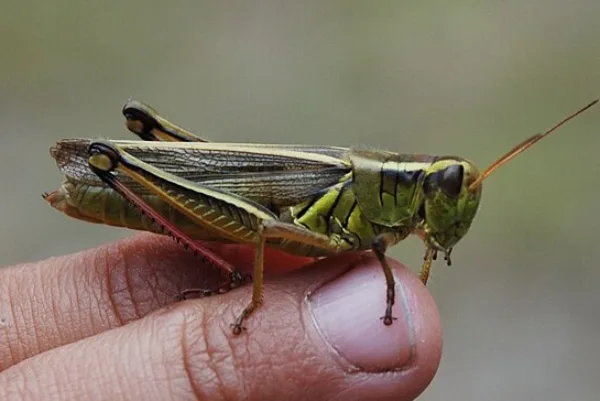
|
Scientific name |
Melanoplus bivittatus |
|
Size |
30-55 cm |
|
Location |
Most parts of US |
|
Identification |
Two pale yellow or whitish strips |
It is one of the largest species of grasshopper of the genus Melanoplus. This species of grasshopper is known for its periodic outbreaks and is considered a major crop pest for alfalfa, corn, etc.
It can be easily differentiated from the other species by its characteristic two pale yellow or white strips that run along its entire length. The wing colors of this species vary from black to brownish and green. The hind femur is primarily blackish in color.
One can easily differentiate between males and females, as females are much larger in size as compared to males. This highly adaptable species of grasshopper from North America prefers lush vegetation.
6. Azure Sand Grasshopper
|
Scientific name |
Sphingonotus azurescens |
|
Size |
1.5-2 inches |
|
Location |
Portugal, Spain |
|
Identification |
Striking black and white coloration with blue wings |
It is named so because of the blue -green coloration of its wings, which are whitish or yellowish at the tips. All over the body of this grasshopper, dark black spots are present. This type of appearance helps them blend in with the sand.
The diet of this herbivore species consists primarily of grasses and other plants. They are quite active and can be found hopping here and there in sandy areas in search of food and mates.
7. Blue-Winged Grasshopper
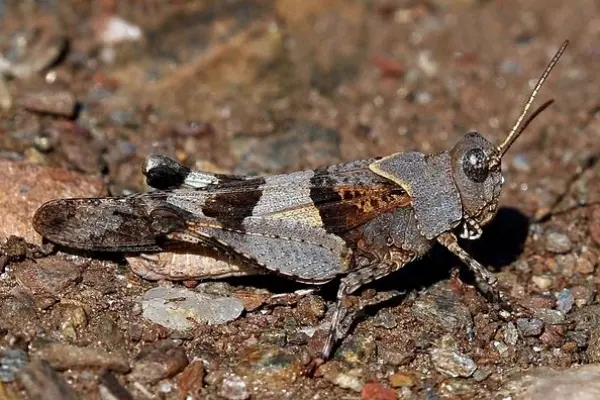
|
Scientific name |
Oedipoda calrulescens |
|
Size |
21-28 mm |
|
Location |
Europe, North America, and Asia |
|
Identification |
Blue wings |
The coloration of this species depends on the environment in which they are developed, which varies from brownish to reddish in color.
They have characteristic blue wings with highlighted black margins. Forewings have 2-3 dark and pale whitish stripes.
They can easily camouflage themselves cryptically in arid regions due to their outer appearance.
They are well adapted to human-made sites like railway track, coal heaps, etc.
8. Rattle Grasshopper
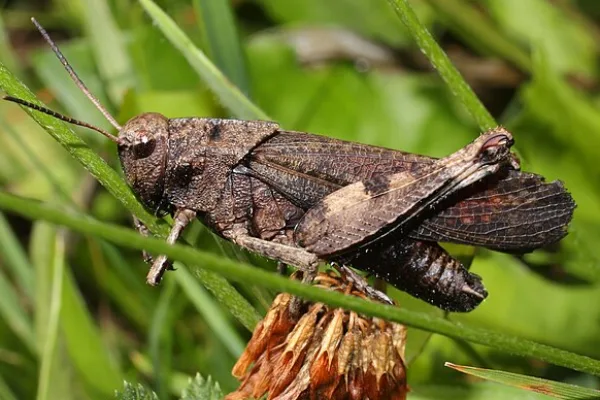
|
Scientific name |
Psophus stridulus |
|
Size |
23-40 mm |
|
Location |
Central and South Europe, in the eastern palearctic realm |
|
Identification |
black body with light spots |
The coloration of this strongly endangered species of grasshopper varies from brownish to grey, ochre or black with pale spots.
Wings are fully developed in males only. Hindlegs have alternate black and pale whitish bands.
9. Carolina Grasshopper
|
Scientific name |
Dissosteira carolina |
|
Size |
32-58mm |
|
Location |
North America |
|
Identification |
Blackish inner wings with yellow-whitish margin |
This North American native species has high ecological value as it feeds on several species of weeds.
Also known as the black winged grasshopper due to its characteristic black-colored wings with white margins. Apart from that they are called by other names as well like Carolina grasshopper, Carolina locust,road-duster or quaker.
Their wings flash during flight, often confuse the predators.
10. Texas Spotted Range Grasshopper Nymphs
|
Scientific name |
Psoloessa texana |
|
Size |
>1 inch |
|
Location |
Nebraska, South Dakota, Texas, and Mexico |
|
Identification |
Pale green with black markings |
This medium-sized grasshopper is a species of around 1 inch with a brownish body and black legs. And white spots are also present in nymphs.
They have twofold ecological value. They maintain the growth of vegetation as well as being food sources for other animals.
You can easily found them in Nebraska, South Dakota, Texas, and Mexico inhabiting sparse vegetation, such as coastal dunes, blowouts, and overgrazed grasslands.
11. White cross grasshopper
| Scientific name | Aulocara femoratum |
| Size | 28 mm |
| Location | Central and North America |
| Identification | Have cross-shaped white lines on its pronotum |
The black and white grasshopper Aulocara femoratum, sometimes called the white-crossed grasshopper, is the next one on our list.
As the name indicates, these grasshoppers can be easily recognized by the white cross-shaped marking on their dark or black pronotum.
This native of Central and Northern America mostly lives in dry prairies, bunchgrass, shortgrass, and grasslands.
They are frequently confused with Aulocara elliotti, its closest relative, which may be distinguished by the form of its eighth abdominal segment.
12. Pallid-winged grasshopper
| Scientific name | Trimerotropis pallidipennis |
| Size | 25 to 45 mm |
| Location | Western North America, South America |
| Identification | Have dark bands over the pale white wings |
One can find this pallid-winged grasshopper from Western North America to South America inhabiting deserts and semideserts.
As you can see in the picture, the color of the wings of this brown-colored grasshopper ranges from white to pale, with characteristic dark black bands over them.
They mostly eat different kinds of grasses and forbs, such as Cryptantha sp., Solarium sp., Iva sp., etc.
13. Caerulean winged grasshopper
| Scientific name | Trimerotropis pseudofasciata |
| Size | 24 to 42 mm |
| Location | Central America and North America |
| Identification | They have blue hind wings |
Trimerotropis pseudofasciata is distinguished by its blue hindwings, which are visible while they fly.
They are commonly known as Caerulean winged grasshoppers. They are found in Central America and North America, from the Great Basin to Utah.
Their pale white body, which is adored and the dark black bands make them alluring yet distinctive. Their look effectively blends them with the surroundings.
14. Lichen grasshopper
| Scientific name | Trimerotropis saxatilis |
| Size | No information |
| Location | North America |
| Identification | Have black markings all over the body |
This band-winged grasshopper species is easily identified by black markings all over the body.
You’re probably wondering why they’re called Lichen grasshoppers because their body patterns are so similar to lichen on rocks that they can easily be disguised.
They have a grayish-white body with characteristic black markings and pale yellow wings. If anyone wants to see this grasshopper, then they must visit North America in late spring or early summer.
Conclusion
With this, we come to an end to our article on black and white grasshoppers. In conclusion, these fascinating black and white grasshoppers play a very important role in nature. Through their black and white coloration, they not only camouflaged themselves but also warned predators that they were not worth eating.
Also Read:

Being a zoology student I’m always been fascinated toward animals especially insects. I love to do research and learn about different animals. As a writer I want to share my thoughts about nature through my articles. Apart from this you can find me exploring the new places and voice notes.
